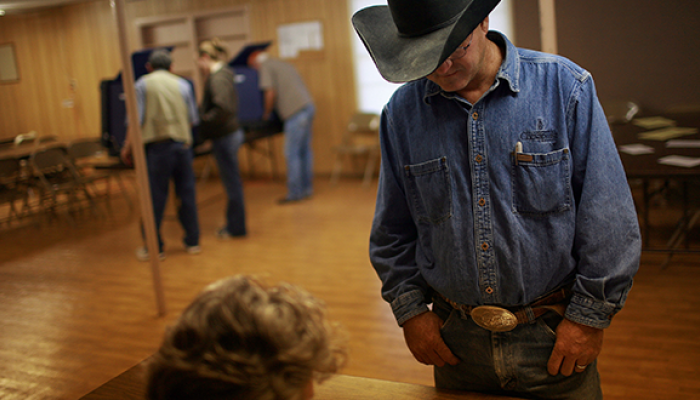What You Should Know About Voter ID in Texas
Voters there are facing a new law

Cross-posted from The Texas Tribune.
In this year’s election, Texas voters are facing a new voter identification law. For many of them, it’ll mean presenting one of a short list of photo IDs at the polls before casting a ballot. But voters who face obstacles to obtaining one of those photo IDs are still able to vote. Those voters need to present another acceptable document verifying their identity, like a current utility bill, and sign a sworn statement indicating the reason that they were unable to obtain one of the accepted photo IDs.
It’s a process that requires Texans to remain vigilant as they go to the polls, because they cannot always rely on election officials to get the details of the policy right or to navigate misleading information that might be out there. For example, some drivers might have seen a billboard on the highway suggesting — falsely — that voters need a passport in order to vote. Furthermore, according to its own website, the Texas Secretary of State’s office has held only one event this year where election officials have gone into communities to provide free photo IDs to voters that need them, despite a legal requirement that the state establish a program to do so.
That fainthearted approach to protecting the rights of eligible voters is unacceptable, and it is particularly troubling given the history of Texas’ voter ID law.
Texas put in place a version of its voter ID law in 2013, following dramatic increases in the state’s black and Latino populations during the previous decade. That year, voters and voting rights advocates — including the Brennan Center — sued the state to prevent the law’s enforcement, arguing that it discriminated against voters of color.
Our group won critical victories in the courtroom fight. A federal district court twice found that the law violated the U.S. Constitution because it was passed with a discriminatory purpose, and both the district court and a federal appeals court found that the law violated federal law with its discriminatory effect on voters of color.
In response to these damning rulings, the Texas Legislature passed the voter ID law that has been in effect during early voting and will be in place on Election Day this Tuesday. In effect, the new law added an option for voters who have a hard time getting one of the listed forms of photo identification: They can present another type of ID from a state list and sign a sworn statement that they had a hard time (or “reasonable impediment” to) getting one of the accepted photo IDs. In court, Texas claimed — and a federal appeals court ruled — that this new alternative would remedy the initial law’s legal violations.
The addition of the sworn statement alternative was a significant win for Texas voters. But it only works if people know that they can use it. Texas officials must do a better job of properly educating voters about their options — this year and in future elections. And Texas voters must be sure they know their rights as they go to the polls.
If you are a Texas voter and you encounter problems at the polls, call 866-OUR-VOTE for assistance.
(Image: Tom Pennington/Getty)


